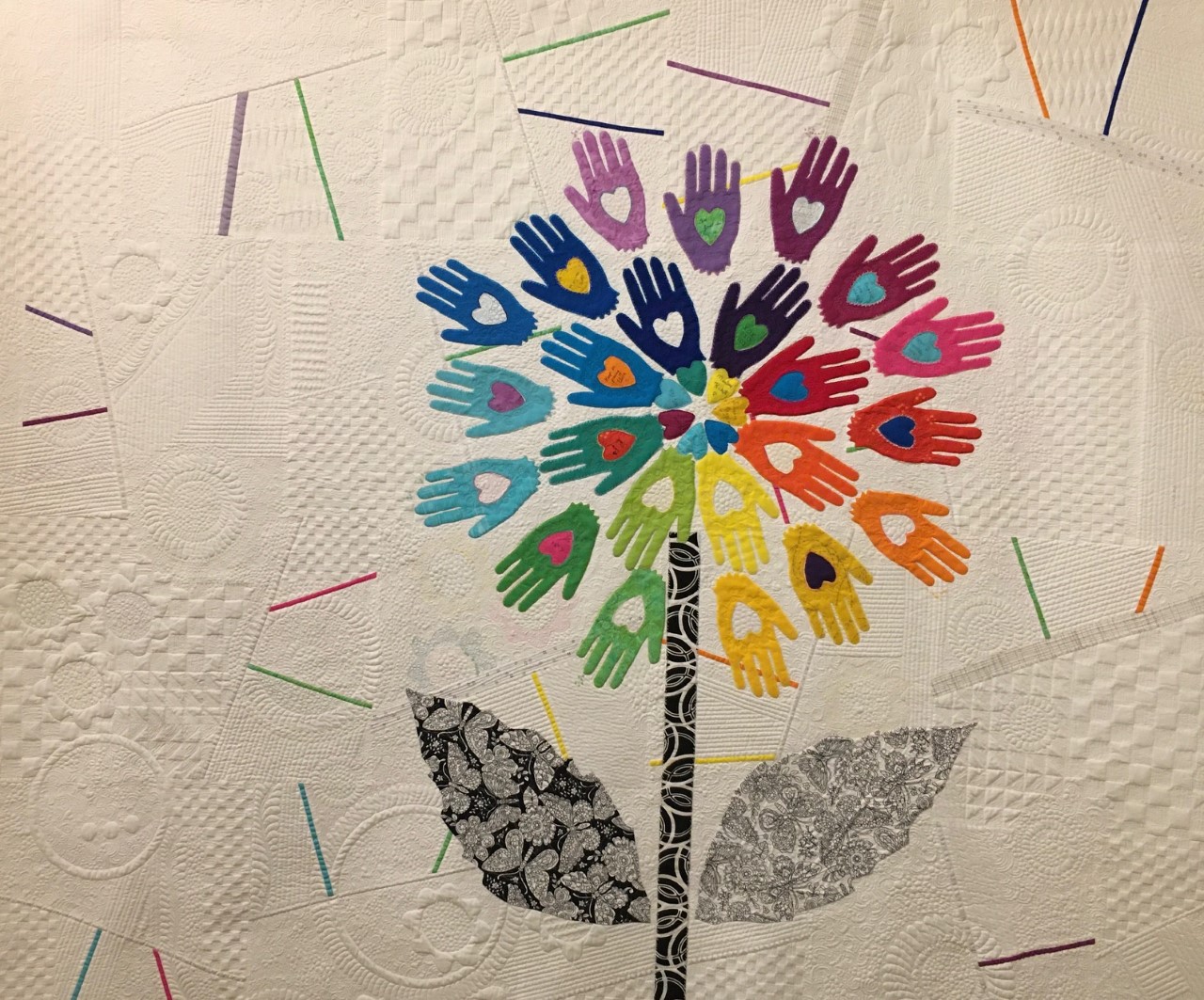I have a personal connection with handmade quilts. As a child I slept beneath a blue and white, cotton hand-me-down. It must have been made in Texas and brought by my father’s mother when she came to live with us. Quilts require maintenance. My grandmother was no homemaker, but a hardworking widow, a schoolteacher with three boys to raise.
This childhood connection with a tattered pre-Civil War quilt draws me back to the splendid exhibits currently on display at the Pacific Northwest Quilt and Fiber Arts Museum on the top of the hill in La Conner.
Cathy Erickson, a Portland, Oregon-based fiber artist, is known for works inspired by the experience of Japanese-Americans who were interned in bleak desert camps during World War II. But Erickson’s present, happier exhibit, “Baltimore Goes Modern,” was assembled from her own collection and on loan from museums.
The Baltimore “album quilts” are an early 19th-century style, popular even today. They are made up of numerous squares, each appliqued with its own design, often by different individuals who worked within a common theme. Many of these quilts are enormous. A 96 inch by 92 inch quilt made in the 1850s memorizes the clipper ship, Carrier Dove. Sailing from Baltimore, bound to San Francisco around Cape Horn, it was damaged by an Atlantic hurricane. If you look closely, you’ll see in addition to the U.S. flag, it also flies that of Brazil, where it stopped for repair.
An earlier quilt from 1848 is incredibly complex and beautiful, with some individual flowers made up of 15 pieces. Another giant is a decorative and fascinating stroll through early 19th century American history, boasting images of the war of 1812, a clipper ship and symbols of Whig presidential campaigns of 1840 and 1844.

The quilts made by Erickson herself riff off of individual elements of the Baltimore style. “Rainbow Garden” focuses on some of the flowers of the album quilts, with generous neutral white space subtly quilted in tiny squares and circles. Describing her bold “Rudbeckia” piece, Erickson said, “At first glance, the viewer would say that this is just a modern pictorial quilt … with modern bold colors and large shapes, [yet] its roots go back to the Scherenschnitte cutwork” — which German immigrants brought to Pennsylvania in the 1700s.
Fifty-three quilters responded to the call to submit their work to a show about birds, entitled “Birds of a Fiber” — from almost 20 states in the U.S. and eight foreign countries, including Japan (a frequent contributor to exhibits at the museum), Belgium, Israel, and even Abu Dhabi!
Susan Fletcher King is the author of the stunning and shocking image of a black crow tearing strips from a blood-red moon, entitled “My Divorce Quilt: Shredded.” Less menacing, crows feature again in Nancy Turbitt’s stunning “Secrets in the Night,” and a dramatic black feather is the central piece in Sonia Grasvik’s “Gift of the Crow.”
It’s fitting that a rainbow lorikeet brightens the room in Australian Irene Manion’s image of the hovering bird above an abstract layer of ferns. But the choice of a northern snowy owl with glistening blue-green eyes surprisingly is the work of Florida artist Michele Oneil.
Oh, no, it’s crows again — this time on a field of green and red in Colorado artist Dorothy Raymond’s work, “Crow Conversation.” Nearby, Debra Zelenak of Wyoming has created what I take to be a lark bunting roosting on a broken fence, backed by a golden field, plus an indigo mountain and a fascinating, rectangular-quilted blue and white sky — very evocative of her state’s best scenery.
Margaret Jessop’s “His Majesty” features a male peacock displaying a confusing spread of green feathers. It’s a regal goodbye to the exhibit.
“Baltimore Goes Modern: The Art & Collection of Cathy Erickson” and “Birds of a Fiber” show from 11 a.m. to 5 p.m. Wednesdays through Sundays through March 27 in La Conner at the Pacific Northwest Quilt & Fiber Arts Museum, 112 Morris St. Entry is $5-$7. For more details, go to qfamuseum.org





